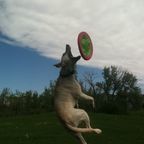Sport and Competition
Is Everything in a Dog’s Life Really "Pretty Short-Lived"?
Dogs don't live in the present so when they say "Not today, please" they mean it
Posted February 21, 2018
In an essay by Daniel Kolitz called "Do Animals Have a Sense of Competition?," I was very surprised to read the following quotation from Arizona State University dog researcher Professor Clive Wynne: "But everything in a dog’s life is pretty short-lived. It’s over quickly." I thoroughly disagree, but let it go when I read it. And, perhaps, he really didn't mean it as literally as some people have taken it to be.
I revisited what Dr. Wynne said after I received a few emails about it, the first of which went, "Given the essays you've written countering the argument—the myth—that dogs live in the present, I'm wondering what you think about Dr. Wynne's statement." In another note the person wrote, "I really cannot believe that he said this. Has he really watched dog behaviour or has he ever homed or worked with a dog who was abused as a youngster?" When I talked with someone about whether or not dogs truly live in the present, someone who knows a lot of facts about the behavior of dogs, they said that they, too, are really surprised when people say something about how dogs are "so Zen-like" and simply live a meditative life in the present, absent any thoughts of the past or the future.

Dogs are influenced by past events and think about and plan for the future
I enjoy thinking about and studying the cognitive and emotional lives of dogs and other animals, so the emails I received and discussions with dog cognoscenti got me thinking more about how the behavior of dogs is influenced by past experiences and thoughts about the future.
The essays to which the first person was referring are called "Dogs Think About and Plan For the Future, Don't They?" and "Dogs Don't Remember Yesterday, Claims Psychologist." Both pieces are available online.
In the first essay, I wrote about a few examples that clearly show that dogs think about and plan for the future. These included pilfering food by faking that someone's at the front door, anticipating routine walks, social play, playing Frisbee, and dog training.

Concerning training, I wrote, "One other example of dogs thinking about and planning for the future focuses on dog training itself. I talked with someone about this as I'm not a trainer, and they mentioned that in their humble opinion, some, but perhaps not all training, involves getting dogs to think about the future consequences of their actions, especially those that they're not supposed to do, which is the basic reason why they need to be trained." Furthermore, trainers are often dealing with a dog's past experiences and need to understand why the dog is behaving as she or he is at the moment because of their own autobiographies.
Anyone who's rescued a dog who's been previously abused also knows how long it can take to rehabilitate them, if ever, so it's clear that what happened in their life isn't short-lived or over quickly. All of the dogs with whom I've shared my home had different backgrounds, and it was thoroughly clear to me that how they responded to similar situations was greatly influenced by their past experiences. Indeed, because I hang out at dog parks a lot, I hear numerous people tell me or others how they have to, or have had to, work very hard to overcome their dogs past experiences. I realize that this isn't necessarily a Nobel-prize winning insight, but that's why others and I are so surprised to read myths about how dogs mainly live in the present.
"Dogs don't remember what happened yesterday and don't plan for tomorrow...My dogs...are stuck in an eternal present."
In the essay called "Dogs Don't Remember Yesterday, Claims Psychologist," I was responding to a piece titled "Dogs Don't Remember' in which it was falsely claimed, "Dogs don't remember what happened yesterday and don't plan for tomorrow...My dogs...are stuck in an eternal present."
There are many examples of dogs and other animals "remembering yesterday." Once again, think of dogs and other animals who have been severely abused and who suffer from severe fear or depression for years on end. Also, think of dogs who remember where they and others have peed and pooped, dogs who remember where their friends and foes live, dogs who change their behavior based on what they learned in various sorts of learning experiments in various research projects, and dogs who remember where they're fed and where they've cached food and other objects to which they later return. The list goes on and on.
When a dogs says, "Not today, please" they really mean it
Dogs are not as "Zen"—meditatively living in the present—as some claim they are. From an evolutionary point of view, it would be somewhat odd and exceptional if mammals such as dogs didn't remember yesterday and plan accordingly, which might include thinking about and planning for the future. There already are many detailed studies that show that mental time travel back to the past and ahead toward the future is not uniquely human.
When a dog says, "Not today, please"—humans often say something like, "Not tonight, I'm tired"—they really mean it. It's just not in their day timer to want to engage in different activities based on their past experiences or what they anticipate will be happening later on. For example, they may be anticipating some sort of "bad" or stressful interactions that make them anxious, as some dogs do when they know they're on the way to the veterinarian's office or somewhere else where there are dogs, other animals, or people who they'd rather not see, hear, smell, or encounter.
I look forward to more citizen science and especially focused research on how past experiences influence dogs, both negatively and positively, and how they engage in future thinking and planning. An incredible amount of comparative data on the cognitive and emotional lives of dogs (and other nonhuman animals) show how misleading it is to underestimate what they're capable of.
References
Marc Bekoff, 2018. Canine Confidential: Why Dogs Do What They Do. University of Chicago Press, Chicago.




